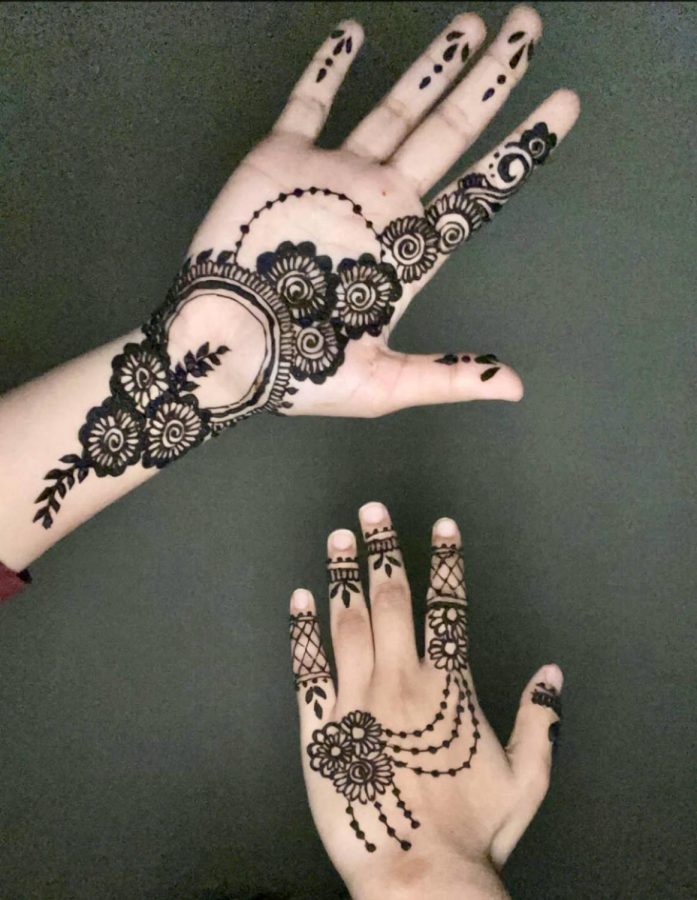Eid al-Fitr: From a Student who Celebrates
Jhumkas. Saris. Bangles. Henna.
Eid al-Fitr marks the end of a long month of fasting and sacrifices for those of us who are Muslim. It comes around twice a year, lasting for three days each time. In Islam, we fast from dawn to dusk (which can be anywhere from 8 to 18 hours depending on the time of year) in order to practice discipline for ourselves and those around us. This period of fasting, reflection, and prayer is called Ramadan. Ramadan teaches the value of food and how to better empathize with the less fortunate. Often people are surprised that I think that Ramadan is overall a positive experience, despite the challenges of fasting everyday for a month.
Nowadays, with constant SAT tutoring and exams, it is hard to find time to have dinner as a family in my home. My parents have meetings that run late, and my brother and I always have homework that requires our attention, so usually we have dinner separately on weekdays. During Ramadan, however, every single day for a month we come together and break our fast, having our first meal of the day as a family. It gives my brother and I time to bond; we make smoothies and appetizers while our parents cook the meal. When we all sit down to break the fast, we begin with a glass of water and a date, and talk about our day while eating the rest of our freshly cooked meal. During Ramadan, our shared built-up hunger brings us closer together.
The celebration of Eid comes after the long month of fasting. Though this holiday lasts for three days, the first day is usually the most exciting and hectic. Ever since my family moved to America in 2009, we have always followed the same routine. The day starts with us getting ready in our cultural clothes. The long patterned skirts and silk saris contrast with my Western clothes, and they remind me of how both sides of my identity can coexist. My mom and I put coconut oil over the intricate henna designs on our hands so that they last longer and look darker. She then takes out a large jewelry box that holds all her bangles (traditional bracelets), jhumkas (traditional Southeast Asian dangly earrings), and colorful bindis (a dot that’s placed on the forehead). We then choose the sets that match the color and design of our dresses and shoes. Every time I get ready in my traditional clothes I am reminded of just how long it took me to feel confident and proud of my culture. Much of my early years at Poly were spent feeling embarrassed about not being “American” enough and always being one of the only brown kids in my classes. Now however, I take pride in showing off my hands covered in henna and sending photos of my dresses to my friends.
My grandma makes sure that all seven of her children and 20 grandchildren go to her house first for a big family breakfast so that she is the first to see us all dressed up. She and my grandfather wait by the door so they can greet us with envelopes filled with money. The front yard is decorated with gold and black banners and balloons that say “Eid Mubarak!” Even from outside of the house, the strong aromas of my grandmother’s deliciously prepared food seeps out. The smell of her hand-rolled sweets envelopes us and draws us to the big dining table that’s stacked with 15 different dishes. Once we eat until there isn’t an ounce of space left in our stomachs, we all head out to my aunt’s house for appetizers, then to my other aunt’s for lunch, then to our house for a late lunch, and it continues until we get to my eldest aunt’s house for dinner. There, the rest of the aunts and uncles give the kids their money envelopes. The festivities usually continue until 2 a.m., when we are all half asleep with our stomachs ready to pop.
When I first saw that Poly was giving us a day off I was pleasantly surprised since there are only a handful of Muslim students in our school. The tricky thing with Eid is that it is difficult to pinpoint the exact date it will happen since it is based on the positioning of the moon. We do not know for sure which day it will fall on until the day after the sighting of the new crescent moon. Although at first I was a little disappointed that we were given the day off on the wrong day, (May 3 instead of May 2) it luckily ended up working in my favor because it meant that I didn’t have to feel stressed about staying up late and having to wake up at 7 a.m. for school. Even though I missed a day, I could spend the next sleeping in and catching up on my work. I was able to spend the entire day focusing on just my family and our festivities instead of worrying about homework I had to complete by the next day.
































